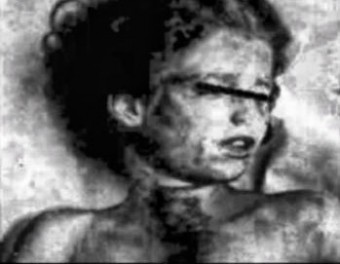Did Leo Frank Confess?
- Published by Editor on September 3, 2012
 On the 99th anniversary of the verdict, we examine the murder of
Mary Phagan and the trial of Leo Frank (Illustration: autopsy photo).
On the 99th anniversary of the verdict, we examine the murder of
Mary Phagan and the trial of Leo Frank (Illustration: autopsy photo).
by Mark Cohen
THE CENTURY-OLD “cold case” Mary Phagan murder mystery — the violent rape and murder of teenager Mary Phagan and the subsequent lynching of the convicted killer, Jewish businessman Leo Frank —
has now been conclusively solved by scholars using the extensive 1913 official investigation and trial records. In this once-in-a-lifetime event, the publishing, mass media, and academic establishments — who have for decades promoted the conspiracy theory that anti-Semites framed Frank for the crime because he was Jewish — have been proven to be wrong by the statements of Leo Frank himself.
- In addition to being an executive of Atlanta’s National Pencil Company, Leo Frank was also a B’nai B’rith official — president of the 500-member Gate City Lodge in 1912 — and even after his conviction and incarceration Frank was elected lodge president again in 1913. As a direct result of the Leo Frank conviction, the B’nai B’rith founded their well-known and politically powerful “Anti-Defamation League,” or ADL.
 |
| Leo Frank |
When Leo Frank mounted the witness stand on Monday afternoon, August 18, 1913, at 2:15 pm, he orally delivered an unsworn, four-hour, pre-written statement to the 250 people present.
Epic Trial of 20th Century Southern History
The audience sat in the grandstand seats of the most spectacular murder trial in the annals of Georgia history. Nestled deep within the pews of the Fulton County Superior Court were the luckiest of public spectators, defense and prosecution witnesses, journalists, officials, and courtroom staff.
Like gladiators in an arena, in the center of it all, with their backs to the audience, seated in ladder-back chairs, were the most important principals. They were the State of Georgia’s prosecution team, made up of three members, led by Solicitor General Hugh M. Dorsey and Frank Arthur Hooper. Arrayed against them were eight Leo Frank defense counselors, led by Luther Z. Rosser and Reuben Rose Arnold. The presiding judge, the Honorable Leonard Strickland Roan, sitting in a high-backed leather chair, was separated by the witness stand from the jury of 12 white men who were sworn to justly decide the fate of Leo Frank.
Crouched and sandwiched between the judge’s bench and the witness chair, sitting on the lip of the bench’s foot rail, was a stenographer capturing the examinations. Stenographers clicked away throughout the trial and were changed regularly in relays.
Surrounding the four major defense and prosecution counselors were an entourage of uniformed police, plainclothes detectives, undercover armed security men, government staff, and magistrates.
The first day of the Leo Frank trial began on Monday morning, July 28, 1913, and led to many days of successively more horrifying revelations. But the most interesting day of the trial occurred three weeks later when Leo Frank sat down in the witness stand on Monday afternoon, August 18, 1913.
The Moment Everyone Was Waiting For
What Leo Frank had to say to the court became the spine-tingling climax of the most notorious criminal trial in US history, and it was the moment everyone in all of Georgia, especially Atlanta, had waited for.

- Leo Frank posing for Collier’s Weekly. The photo would later become the front cover for the book The Truth About the Frank Case by C.P. Connolly. In the picture, the fingertips of Leo Frank’s left hand are firmly clasped around the base of a cigar, vertically projecting upward from his groin region. The significance of Leo Frank’s left fist would be revealed when the Mary Phagan autopsy, conducted on Monday, May 5, 1913, by Dr. H. F. Harris, was reported during the Leo Frank trial.
Read more>>Did Leo Frank Confess?



